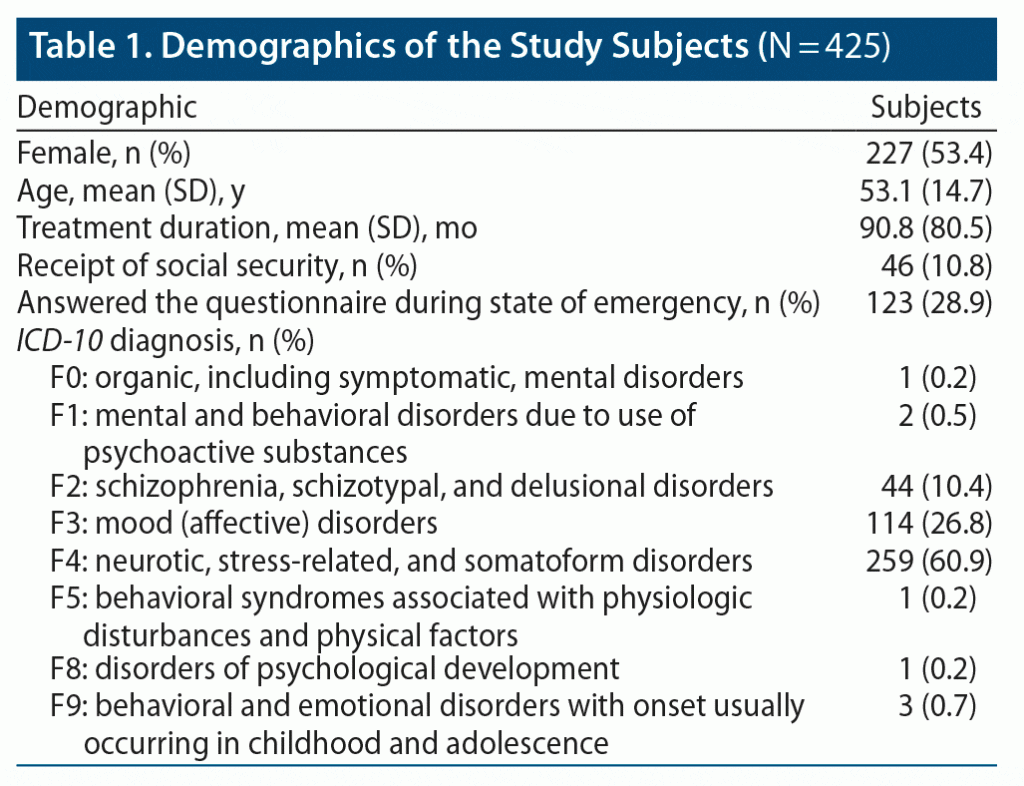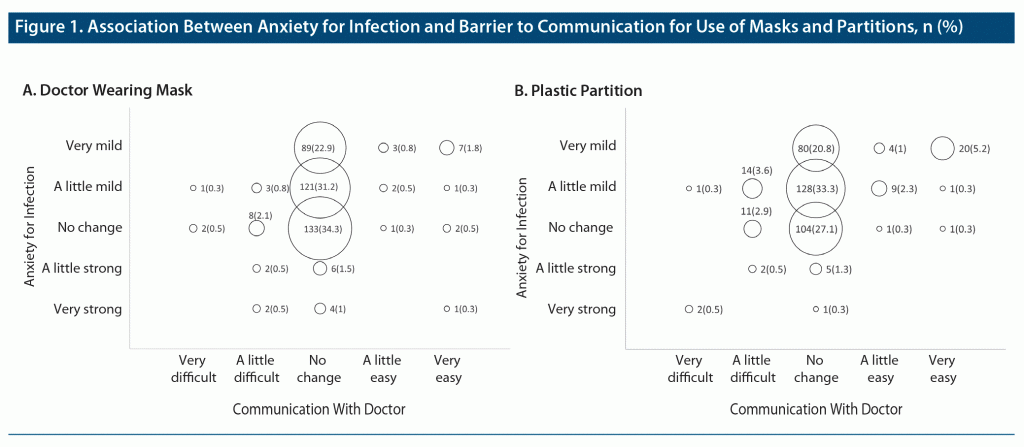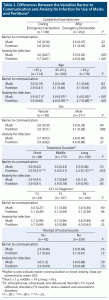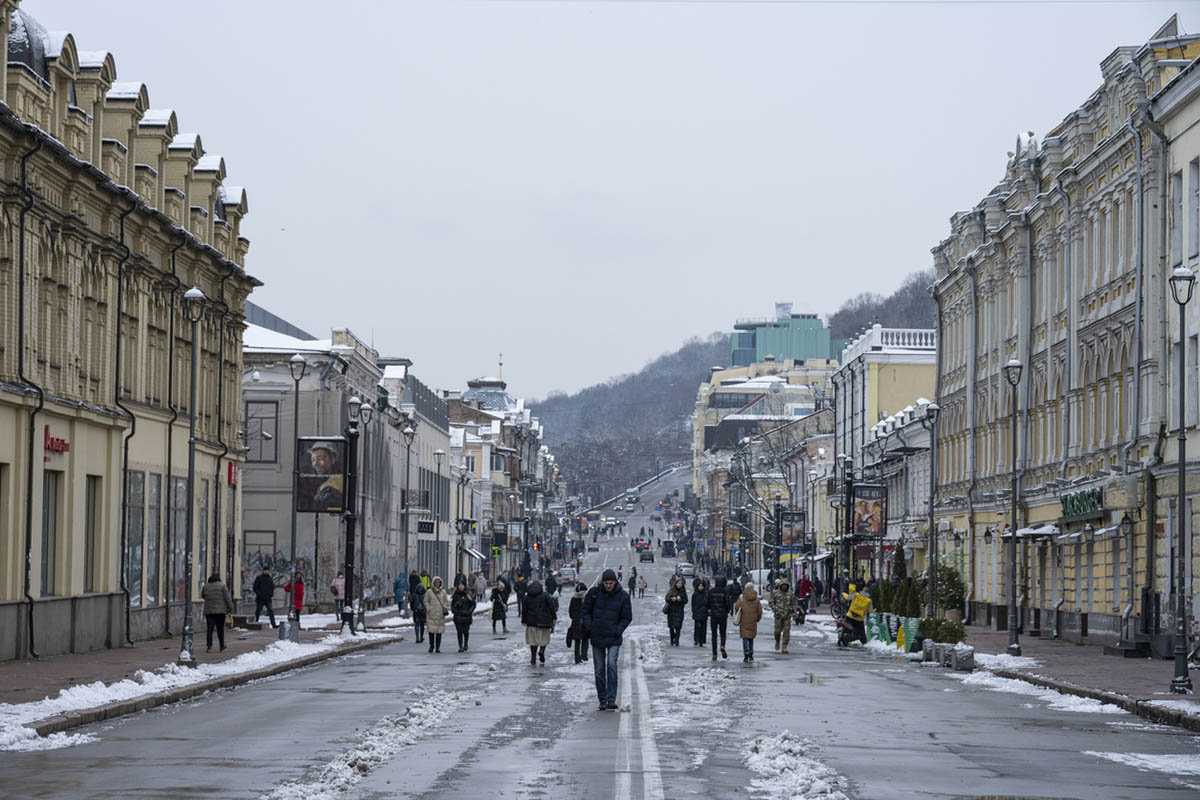ABSTRACT
Objective: To investigate the impact of masks and plastic partitions on patient-doctor communication and subjective anxiety for infection in patients with psychiatric disorders.
Methods: Subjects were patients who visited a psychiatric clinic in Japan from April 27 to August 31, 2020. Anxiety of being infected and the psychological barrier to communication were evaluated on a 5-point scale.
Results: The final analysis included 425 patients. Most participants answered that there was no change with regard to communication when the doctor was wearing a mask (n = 353, 91.0%) or using a plastic partition (n = 318, 82.8%). Most participants responded that anxiety for being infected was very mild, a little mild, or not changed by the doctor wearing a mask and using a plastic partition. Most participants felt significantly less anxiety with the doctor wearing a mask/using a plastic partition before than after the state of emergency declaration (P = .005 for mask and P < .001 for plastic partition). Participants in the older age range felt significantly higher anxiety compared to those in the younger and middle age range groups from doctors wearing masks (P < .001) and compared to those in the middle age range group from plastic partitions (P = .001).
Conclusions: Use of masks and plastic partitions in psychiatric practice is recommended, as it may result in reduction of anxiety for infection without affecting patient-doctor communication in patients with psychiatric disorders. The generalizability of the results of the present study should be tested.
Prim Care Companion CNS Disord 2021;23(4):21m02921
To cite: Imai H, Furukawa TA. Psychological impact of masks and infection-prevention plastic partitions on anxiety for infection and patient-doctor relationships during the COVID-19 pandemic. Prim Care Companion CNS Disord. 2021;23(4):21m02921.
To share: https://doi.org/10.4088/PCC.21m02921
© Copyright 2021 Physicians Postgraduate Press, Inc.
aDepartment of Health Promotion and Human Behavior, Kyoto University Graduate School of Medicine/School of Public Health, Kyoto University, Kyoto, Japan
bOhashi Psychiatric Clinic, Takarazuka City, Hyogo, Japan
*Corresponding author: Hissei Imai, MD, PhD, Department of Health Promotion and Human Behavior, Kyoto University Graduate School of Medicine/School of Public Health, Yoshida Konoe-cho, Sakyo-ku, Kyoto 606-8501, Japan ([email protected]).
Mental health is deteriorating around the world due to the prolonged coronavirus disease 2019 (COVID-19) pandemic. A national survey1 in the United Kingdom reported that the prevalence of mental health problems increased by 13.5% in April 2020 compared to 2017–2019. Mitigation of the psychological impact of COVID-19 is an emergent and urgent issue. Protection of vulnerable populations, including patients with psychiatric disorders, is especially important because bidirectional associations between COVID-19 infection and psychiatric disorder have been suggested.2
Infection prevention measures are a primary necessity in daily medical practice. Additionally, a good patient-therapist relationship is also indispensable in psychiatric practice. Good patient-therapist relationships account for 7%–15% of the therapeutic effect.3 However, it is unknown if infection prevention measures and good patient-therapist relationships are compatible.
Medical masks and eye protection are 2 of the major infection prevention measures indicated to reduce person-to-person transmission.4 However, these measures interfere with nonverbal communication through facial expression, which is invaluable in emotional experience.5
Our psychiatric clinic is located in a middle-sized city in western Japan that has served approximately 650–750 patients per month during the COVID-19 pandemic. We use medical masks and plastic partitions between patients and clinic staff, including doctors, instead of wearing eye protection to prevent infection.
The aim of the present study is to investigate the influence of masks and plastic partitions on patient-doctor communication and subjective anxiety among patients with psychiatric disorders.
METHODS
Subjects
Subjects were patients who visited the psychiatric clinic in Takarazuka City, Japan. It has a population of about 22,000 and is located near Osaka City, which is the second largest city in Japan.
Patients were included in the study if they were aged 16 years or older. Excluded patients were those with dementia, mental retardation, or other conditions that prevent answering questions without special assistance. First-visit patients were also excluded because participants had to compare their impressions before and during the COVID-19 pandemic. The study was conducted April 27–August 31, 2020 and was approved by the Kyoto University Ethics Committee (R2468). Written informed consent was obtained from all participants.
In Japan, the first human-human infection of COVID-19 was reported on January 28, 2020. The first case of COVID-19 infection in a neighboring city was reported on March 1, 2020, and the first case in our city was reported on March 7, 2020. Doctors at the study site began to wear masks at that time. The Japanese government declared a state of emergency on April 7, 2020. Our clinic placed plastic sheets between the clerk and patients in the reception area on April 19th and plastic partitions in the consultation room on April 24th. The Japanese government declared the end of the state of emergency on May 25th. The number of patients visiting our clinic was almost stable even during this period; however, the number of first-visit patients in April was less than half of that prior to COVID-19.
Masks and Plastic Partitions
Medical masks were used throughout the hospital. An almost transparent plastic partition was set on the desk between the patient and doctor. The partition was 50 cm tall and 90 cm wide and completely covered the faces of the patient and doctor.
Questionnaire
The subjective anxiety of being infected was evaluated with the question “Compared to before the doctor started wearing a mask/using a plastic partition, anxiety for being infected has become” on a 5-point scale: 1 (much stronger), 2 (slightly stronger), 3 (no change), 4 (slightly weaker), or 5 (much weaker). The psychological barrier of communication was evaluated with the question “Compared to before the doctor started wearing a mask/using a plastic partition, describing your emotions and thoughts to the doctor has become” on a 5-point scale: 1 (much more difficult), 2 (slightly more difficult), 3 (no change), 4 (slightly easier), or 5 (much easier).
Statistical Analysis
The relationship between subjective anxiety and barrier to communication was evaluated visually by using the bubble chart for use of both masks and plastic partitions. The difference in subjective anxiety and barrier to communication according to factors was examined by Mann-Whitney test for variables with 2 groups and Kruskal-Wallis test for variables with 3 groups. When a significant difference was observed by Kruskal-Wallis test, Dann-Bonferroni test was used for post hoc pairwise analysis. The threshold for statistical significance was P < .05. Statistical analysis was performed using SPSS 20.0 (IBM Inc, Armonk, New York).
RESULTS
A total of 770 patients visited the clinic during the study period. Among those, 314 were excluded due to the following: first-visit patients (n = 224), dementia (n = 27), mental retardation (n = 18), surrogate consultation (n = 17), home visit (n = 14), eye trouble (n = 6), poor condition (n = 1), finger tremor (n = 1), and aged < 16 years (n = 1). The number of patients who met the inclusion criteria was 456. However, there were patients who declined to answer (n = 7) or who were missed due to clerical errors (n = 24). The number of participants included in the final analysis was 425 (93%).
Table 1 provides the demographics of the participants, which comprised 227 (53.4%) females. The mean (SD) age of the sample was 53.1 (14.7) years, and the period of outpatient treatment was 90.8 (80.5) months. The questionnaire was answered during the emergency declaration by 123 (28.9%) subjects. The most prevalent ICD-10 diagnoses were F4: neurotic, stress-related, and somatoform disorders (n = 259, 60.9%); F3: mood (affective) disorders (n = 114, 26.8%); and F2: schizophrenia, schizotypal, and delusional disorders (n = 44, 10.4%).
Figure 1 shows the association between anxiety for infection and barrier to communication. Most participants answered that there was no change with regard to discussing their emotions and thoughts with the doctor wearing a mask (n = 353, 91.0%) and using plastic partitions (n = 318, 82.8%) compared to pre–COVID-19. Regarding anxiety for infection, most participants answered very mild or a little mild for the doctor wearing a mask (very mild: n = 89, a little mild: n = 121, no change: n = 133) and using a plastic partition (very mild: n = 80, a little mild: n = 128, no change: n = 104).
The differences for barrier to communication and anxiety for being infected according to timing of response to the questionnaire (during or after the state of emergency declaration), age range, sex, treatment duration, ICD category (F2, F3, F4), and receipt of social security are provided in Table 2.
More participants felt significantly less anxiety from doctors’ wearing masks/using plastic partitions during than after the state of emergency declaration (P = .005 for masks and P < .001 for plastic partitions), but there were no significant differences in psychological barriers to communication.
Older participants felt significantly greater anxiety compared to those in the younger and middle age ranges from doctors wearing masks (P < .001) and compared to those in the middle age range from use of plastic partitions (P = .001). There was no significant difference for psychological barrier to communication between the age ranges.
The psychological barrier to communication was significantly higher in participants with short treatment duration compared to those with long treatment duration (P = .03), but there were no significant differences according to the treatment period with regard to psychological barrier to communication and anxiety for infection. No significant differences were observed according to sex, ICD-10 categories, and receipt of social security.
DISCUSSION
This is the first study evaluating the impact of infection prevention measures on anxiety for infection and patient-doctor communication. The results suggest that masks and plastic partitions may not prevent patient-doctor communication, and both will result in beneficial effects in reducing anxiety for infection among patients with psychiatric disorders.
The beneficial effect in reducing anxiety was greater in the post state of emergency period, although both masks and plastic partitions reduced anxiety for infection. According to the extended parallel process model, behavior or attitude is the result of perceived risk and self-efficacy.6 Reports on the longitudinal change in mental health during the COVID-19 pandemic are conflicting. A study from the United Kingdom showed that the population prevalence of mental health problems slightly decreased but remained elevated from April 2020 (37.8%) to June 2020 (31.9%).1 A study7 from Spain found that the somatic score of anxiety increased from 32.5 at the first survey to 37.2 at the second survey, although daily cases and deaths during the first survey were much higher than those during the second survey. A study8 from China showed a reduction of impact of event according to the decline in cases (from 33.0 to 30.8). It should be determined whether the reduced anxiety in the post state of emergency period was due to the reduction of perceived risk or increased self-efficacy by mask/plastic partition.
With regard to age groups, the beneficial effect of masks and plastic partitions was smaller in older patients, whereas there was no significant difference in the barrier to communication. People in the older age group may perceive greater risk than those in the younger age groups, as it is reported that infection-fatality risk is much higher for elderly individuals.9 Increased support to address anxiety in elderly people should be considered.
Interestingly, participants with shorter treatment duration felt greater barriers to communication with plastic partitions than did those who had been in treatment for a longer period. The patient-doctor relationship built in the long term may have decreased the barrier from the plastic partition. However, this significant difference may be caused by chance, as the present study evaluated various comparisons. A study focusing on influence of time on the barrier to communication due to plastic partitions is warranted.
Although the present study provides new insights, it has several limitations. First, participants answered the questionnaire 1 time during the study period. Thus, the reproducibility of the results is uncertain. However, the responses for barrier to communication from different participants were almost the same during and after the state of emergency period, which may imply some reproducibility of response for certain items. Second, the questionnaire requested that participants remember the situation without a mask and plastic partition before the COVID-19 pandemic, which may have biased the results. The comparison of response should be conducted between situations with and without a mask/plastic partition in future studies. Third, generalizability of the results should be tested in future studies. In comparison with general psychiatric clinics in the Japanese governmental survey,10 the present sample had a similar gender ratio but more patients with neurotic disorders, although the present study excluded patients with dementia and mental retardation. This may have influenced the results. Additionally, cultural background should be considered. People in Japan were used to wearing masks before the COVID-19 pandemic. Also, many people in Japan wear masks during the spring season for pollen allergy. The influence of masks on communication may be lower in Japan compared to other cultures where the wearing of masks is unusual. Fourth, the psychiatric disorders of the participants were unbalanced. Most of the study participants had neurotic or mood disorders. The number of participants with psychotic disorder was relatively small, which may underestimate the results according to disorders. Additionally, a similar study should be conducted for patients with no general medical conditions.
CONCLUSION
Use of masks and plastic partitions in psychiatric practices is recommended, as it may result in reduced anxiety for infection without affecting patient-doctor communication in patients with psychiatric disorders. The generalizability of the results of the present study should be tested.
Submitted: January 14, 2021; accepted April 23, 2021.
Published online: July 8, 2021.
Author contributions: Both authors conceived and designed the study. Dr Imai performed data collection and analysis. Both authors contributed to interpreting the data and drafting, revising, and approving the manuscript.
Potential conflicts of interest: Dr Imai reports lecture fees from Mochida and personal fees from Mitsubishi-Tanabe and Kyowa outside the submitted work. Dr Furukawa reports grants and personal fees from Mitsubishi-Tanabe and personal fees from MSD and Shionogi outside the submitted work and has a patent (2018-177688) concerning smartphone CBT apps pending and intellectual properties for a Kokoro app licensed to Mitsubishi-Tanabe.
Funding/support: None.
Acknowledgments: The authors thank the patients who answered the questionnaire and appreciate the assistance of Tatsuo Mita, MD, PhD, who provided guidance in the present study. Dr Mita has no conflict of interest to declare.
Clinical Points
- Use of masks and plastic partitions by clinicians may reduce patients’ anxiety for infection.
- Use of masks and plastic partitions by clinicians may not impair patient-doctor communication.
References (10)

- Daly M, Sutin AR, Robinson E. Longitudinal changes in mental health and the COVID-19 pandemic: evidence from the UK Household Longitudinal Study [published online ahead of print November 13, 2020] . Psychol Med. PubMed CrossRef
- Taquet M, Luciano S, Geddes JR, et al. Bidirectional associations between COVID-19 and psychiatric disorder: retrospective cohort studies of 62,354 COVID-19 cases in the USA. Lancet Psychiatry. 2021;8(2):130–140. PubMed CrossRef
- Horvath AO, Del Re AC, Fluckiger C, et al. Alliance in individual psychotherapy. In: Norcross JC, ed. Psychotherapy Relationships That Work. 2nd ed. New York, NY: Oxford University Press; 2011:25–69.
- Chu DK, Akl EA, Duda S, et al; COVID-19 Systematic Urgent Review Group Effort (SURGE) study authors. Physical distancing, face masks, and eye protection to prevent person-to-person transmission of SARS-CoV-2 and COVID-19: a systematic review and meta-analysis. Lancet. 2020;395(10242):1973–1987. PubMed CrossRef
- Coles NA, Larsen JT, Lench HC. A meta-analysis of the facial feedback literature: effects of facial feedback on emotional experience are small and variable. Psychol Bull. 2019;145(6):610–651. PubMed CrossRef
- Witte K. Putting the fear back into fear appeals: the extended parallel process model. Commun Monogr. 1992;59(4):329–349. CrossRef
- Planchuelo-Gómez Á, Odriozola-González P, Irurtia MJ, et al. Longitudinal evaluation of the psychological impact of the COVID-19 crisis in Spain. J Affect Disord. 2020;277:842–849. PubMed CrossRef
- Wang C, Pan R, Wan X, et al. A longitudinal study on the mental health of general population during the COVID-19 epidemic in China. Brain Behav Immun. 2020;87:40–48. PubMed CrossRef
- Verity R, Okell LC, Dorigatti I, et al. Estimates of the severity of coronavirus disease 2019: a model-based analysis. Lancet Infect Dis. 2020;20(6):669–677. PubMed CrossRef
- Japanese Ministry of Labour and Welfare. Patient survey. 2017. Accessed June 15, 2021. https://www.e-stat.go.jp/stat-search/file-download?statInfId=000031790631&fileKind=1
Enjoy this premium PDF as part of your membership benefits!









